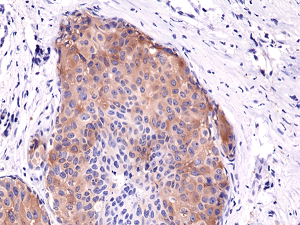anti-Phospho Acetyl CoA Carboxylase (S79) (human) Rabbit Monoclonal (RM270)
Product Code:
REV-31-1151-00
REV-31-1151-00
Antibody Isotype:
Rabbit IgG
Rabbit IgG
Antibody Clonality:
Recombinant Antibody
Recombinant Antibody
Antibody Clone:
RM270
RM270
Regulatory Status:
RUO
RUO
Target Species:
Human
Human
Applications:
- Immunohistochemistry (IHC)
- Western Blot (WB)
Shipping:
Blue Ice
Blue Ice
Storage:
+4°C
+4°C
No additional charges, what you see is what you pay! *
| Code | Size | Price |
|---|
| REV-31-1151-00-R100 | 100 ul | £455.00 |
Quantity:
Prices exclude any Taxes / VAT



